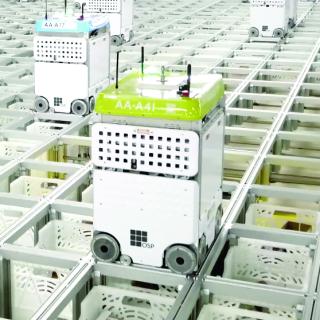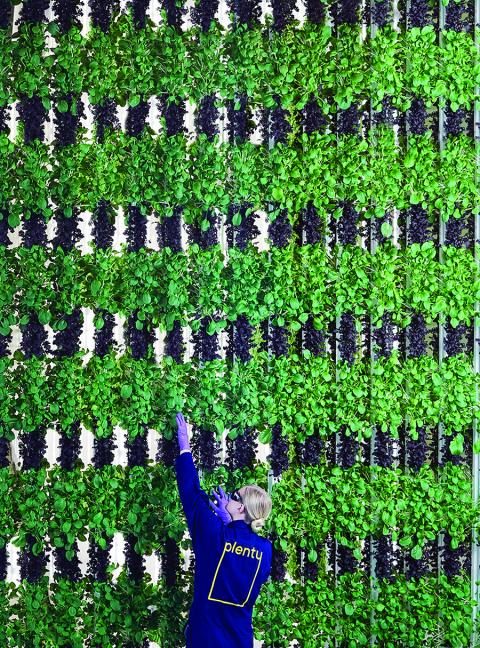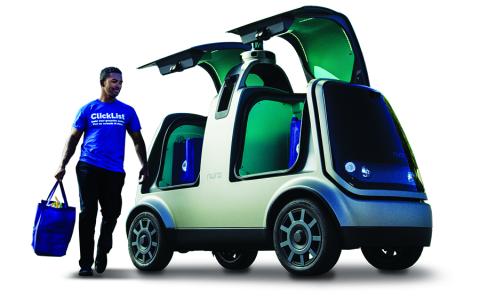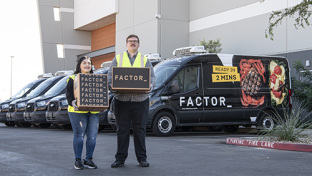What’s Next For America’s Grocers: Progressive Grocer’s 88th Annual Report
The food and consumables industry enjoyed record sales growth in 2020 as consumer behavior shifted dramatically due to the pandemic. The effect of COVID-19 is evident in the performance of every company on this year’s PG 100 ranking. What’s next for America’s grocers is less clear, however. As the pandemic begins to wane and vaccination rates move well past 50% this summer, a great reopening of the world’s largest economy will unfurl, bringing known and unknown changes to the world of food and consumables. As this era of uncertainty arrives in the second half of 2021, it brings new challenges and opportunities, blended with intensifying trends, all of which is overlaid by the rapid advancement of technology and shifting shopper behaviors and product preferences. These themes are explored in Progressive Grocer’s 88th Annual Report.

Annual reports typically serve a few purposes for companies. They’re an opportunity to review prior-year accomplishments, reinforce strategic priorities and share a vision of how the company plans to grow. This approach has a lot in common with Progressive Grocer’s 88th Annual Report. We revisit a year unprecedented in the annals of retailing, which was filled with notable developments, and look toward the future to share insights and perspectives consistent with Progressive Grocer’s “Ahead of What’s Next” brand vision.
This was the same aspiration we had about this time last year, when we published our 87th Annual Report. The big difference between now and then was that COVID-19 was just beginning to grip the nation, whereas today, there’s finally light at the end of the pandemic tunnel. Go back to March 13, 2020, when a national emergency was declared and reflect on the reaction of Americans and retailers. A food shopping frenzy left grocers’ shelves bare; Americans were scared, unsure about what measures to take to protect themselves, and adjusted their lifestyles accordingly. Home became the center of everything – work, school, entertainment – as previously normal activities, such as eating at restaurants, going to movies or sporting events, or even having elective surgery, were suddenly off-limits.
READ THE REST OF OUR ANALYSIS
Pandemic-Fueled Record Growth in 2020: The PG 100
Retailers found ways to maintain operations, despite the unprecedented circumstances, and displayed tremendous ingenuity to keep customers and workers safe while working closely with suppliers to ensure the availability of products. It wasn’t pretty at times, but grocers got the job done as the pandemic increased its grip on the nation.
It was against this backdrop of swirling chaos, barely a month into the pandemic, that Progressive Grocer published its 87th Annual Report in April 2020. The goal at the time was to embrace our mantle of leadership by peering into the future and identifying key ways that the world of food retailing would change forever.
It was a challenging exercise, given that many issues related to COVID-19 were still in flux, most notably the severity and duration of the pandemic. Despite this handicap, some of the prognostications made at the time proved more accurate than we could have imagined as the pandemic dragged on. They’re worth revisiting, because many are still relevant.
For example, we described the advent of touchless commerce and the acceleration of e-commerce. “Every aspect of food retailers’ operations will be impacted by this aversion to surfaces, ushering in the age of touchless commerce,” we wrote of this emerging new reality. As for e-commerce, we noted that “COVID-19 has served as the ultimate catalyst to accelerate innovation around the shopping experience of the future.”
Other predictions of enduring change related to heightened interest in supply chain efficiency and enhanced sanitation protocols, the death of self-service, and a sustained shift to at-home cooking. Perhaps the most prescient of the lasting changes highlighted in the prior year’s Annual Report related to labor issues and the need to revamp hiring and training. We opined: “Grocers will need to accelerate investments in automation as labor becomes more expensive and consumers demand pickup and delivery options that drain profits. Operating costs will remain under pressure for a long time.”

Now What Happens?
Revisiting events from the prior year and predictions about lasting changes brought on by a pandemic is a useful way to pivot toward conversations about the current environment and the road ahead. In many respects, the future seems clearer now that it did a year ago at this time. For starters, multiple highly effective vaccines were developed in record time. By the midpoint of the year, roughly half of the nation will have been immunized, helping the nation achieve escape velocity to break free from the lifestyle-altering forces of a pandemic.
This shift isn’t necessarily good news for food retailers for a couple of reasons. At a high level, it means that the displaced demand that flowed to food retailers from restaurants that were shuttered or operating at reduced capacity due to social-distancing restrictions will now flow back to foodservice operators. How much of it and how fast is unclear, but the negative effect in 2021 is likely to be as profound as the positive effect was in 2020, when the combination of reduced access to restaurants and pantry loading led to sales gains that were well into the double digits. Already, major publicly held retailers are forecasting flat to declining same-store sales for the duration of 2021 as they lap extraordinary gains in 2020.
One way to assess the potential negative effects of a COVID-19 recovery on grocery this year is to look at the extent of pain and suffering felt by the restaurant industry last year. The National Restaurant Association (NRA) described the pandemic as a devastating force that put the industry through the worst business conditions in history. The restaurant and foodservice industry lost an estimated $240 billion in sales and roughly 8 million employees were laid off or furloughed. As of Dec. 1, Washington, D.C.-based NRA estimates in its “2021 State of the Industry” report that more than 110,000 eating and drinking establishments completely closed for business temporarily or for good. So, while the pendulum swings back toward food and away from food at home, the fact that there are fewer foodservice operators in business suggests that grocery won’t give back all of the share-of-stomach gains it realized during the past 14 months.
NRA concedes as much in its annual report, noting, “Although restaurant and foodservice sales are expected to post double-digit growth in 2021, it won’t be nearly enough to make up for the substantial losses experienced in 2020.”
Even so, there will be enough of a restaurant rebound that food retailers will feel a COVID-19 sales hangover. This issue of where the pendulum settles between food at home and food away from home will be a major overhang on the industry in 2021, but there are plenty of other issues where uncertainty abounds and opportunity beckons. As was the case last year, we peer into the future for our annual look at the key changes, trends, new realities and shifting societal expectations affecting the world of food and consumables. Our hope is to provide a clear-eyed view of what’s next for America’s grocers.

Faster Forever
A common statement heard during the digital age relates to how an accelerating pace of change is causing disruption and transformation. While true generally, excessive usage left the phrase sounding trite. That’s no longer the case after the pandemic hit, when it became common to hear retailers talk of compressing five years of change into five weeks. This was especially true in the area of e-commerce, where aversion to physical spaces led to rapid adoption of grocery delivery and pickup services, which many retailers scrambled to implement and expand, experiencing triple-digit growth rates in the process. The newfound sense of urgency that grocers discovered during the pandemic came to life in other areas as well, from rationalizing assortments to coping with supply chain issues to quickly implementing enhanced safety protocols in stores.
What’s Next: Retailers that thought they moved fast and were early adopters of innovation prior to the pandemic gained a new appreciation for what an accelerated pace of change and true disruption really looks like. It may have taken a pandemic, but many in the grocery industry quickly developed a more solid digital footing that will serve as an accelerant of continued change and more rapid adoption of products and services demanded by shoppers.

The Role of the Store
The future of physical retailing is the subject of much debate. That was the case before the pandemic, but it has intensified as shopper traffic has declined, sales have shifted online and transaction sizes have increased. Stores increasingly functioned as highly inefficient fulfillment centers for pickup and delivery orders throughout the pandemic, but now what? Consumer surveys on the issue of resuming physical shopping are conflicting and inherently flawed, because stated intentions tend to differ materially from actions. This leaves most retailers in a broad middle ground, convinced that stores will still matter, but that they’ll be used differently by shoppers as ever larger volumes and food and consumables sales are digitally enabled. It’s a safe position to take, and there is ample evidence to support the view, considering the success that many retailers have enjoyed by adopting a seamless mindset.
What’s Next: Retailers will continue to embrace all things digital, which is important because that’s what shoppers want. However, efforts need to be made to help shoppers regain an appreciation for the joy of food shopping and exposure to the aromas of freshly prepared offerings, beautifully merchandised produce and the random discovery of new items in the center store. Doing so will do wonders for financial results, because the pandemic caused shoppers to shift to the highest cost-to-serve model imaginable. Retailers should have strategies ready to entice shoppers back into physical stores when the pandemic is officially declared over, which for many shoppers will mean the ability to ditch their face coverings in stores without visual cues of lurking danger, such as hygiene barriers and big jugs of hand sanitizer.

Business Model Innovation
Investors earlier this year handed online food retailing startup Misfits Market $200 million in additional funding, valuing the two-and-a-half year old company at more than $1 billion. Delanco, N.J.-based Misfits got its start as an online seller of surplus produce, but recently, its assortment expanded to include packaged goods and meat. Fellow startup Imperfect Foods, a San Francisco-based grocery delivery service similar to Misfits, also secured $95 million in new funding earlier this year, bringing its total amount raised to more than $700 million. Meanwhile, Burlingame, Calif.-based online grocer Farmstead recently secured $7.9 million, bringing its total funding to roughly $15 million, which it plans to use to enter 14 new markets in 2021.
What these companies have in common is that they perceive traditional grocers as market share donors to their new approach. Farmstead describes itself as “the first online grocer to offer fresh, high-quality groceries, delivered for free, at better prices than local supermarkets.” Misfits Market takes a similar tack, asserting that “it delivers fresh organic produce, sustainably sourced pantry staples, and other grocery items straight to your door at up to 40% off grocery store prices.
What’s Next: A large, mature market that has been slow to adopt technology and largely unwilling to disrupt itself presents potential challenges to incumbent food retailers. The good news is that much of the startup activity involves technology solutions from innovators that help food retailers operate more efficiently; optimize pricing, promotion and assortment decisions; improve order accuracy; and reduce food waste. Other good news from the retailers’ standpoint: Cheap money continues to fuel risk-taking in the startup world as investors seek outsize returns by helping potential disruptive companies grow.

Supply Chain Efficiency
This was a call out in last year’s annual report, but it’s worth highlighting again this year, and that will be the case next year and beyond. That’s because, as successful retailers and suppliers know, the supply chain is everything in food retailing, an industry with the most complex supply chain of all retail sectors. The pandemic exposed some vulnerabilities, if that’s what out-of-stocks associated with frenzied shopper behavior can be called. By and large, however, supply chains functioned at a high level, with product supply interruptions falling into the classification of first-world inconveniences. Where supply chains were particularly stressed was in the area of the so-called last-mile fulfillment of online orders, whether delivered or picked up at the store. This is an area of vulnerability as grocers are racing to get digital right.

What’s Next: The path forward with the optimal-fulfillment method for online grocery should gain some clarity in 2021. Huge bets have been placed on micro- and macro-fulfillment solutions. On the one hand, there’s The Kroger Co., which, through its partnership with U.K. online grocer Ocado, is building massive fulfillment centers filled with robotic picking technology. Two of 11 planned facilities, both measuring 375,000 square feet, are now operational near Kroger’s hometown of Cincinnati and Orlando, Fla. Meanwhile, micro-fulfillment technology is attracting major investment. Japan’s SoftBank recently spent $2.8 billion to acquire a 40% stake in European micro-fulfillment leader AutoStore. The investment values AutoStore at nearly $8 billion, a tidy sum to pursue growth in the online grocery world.

Expense Pressure
Between appreciation bonuses, hero pay and routine hourly wage increases, 2020 was a year unlike any other from the standpoint of hourly employees. In addition, front-line employees qualified to receive multiple stimulus payments from the federal government. After receiving windfalls of varying degrees over the past 14 months, front-line workers could be in for another boost.
Legislation introduced in January called Raise the Wage Act of 2021 would effectively double the federal minimum wage to $15 an hour. More recently, President Joe Biden signed an executive order requiring federal contractors to pay a $15 minimum wage “to hundreds of thousands of workers who are working on federal contracts.” This was dismissed by some as largely symbolic because of the small number of people affected, but the optics of an action tend to matter more in Washington, D.C., than the actual impact. Either way, retailers will be facing increased expense pressure as the wage floor moves up.
What’s Next: The perennial challenge for the retail industry overall, and food retail in particular, is having a fact-based conversation that balances the hourly wages paid with the opportunity afforded by the industry. For example, Bureau of Labor Statistics data for 2020 shows that 55.5% of workers age 16 and over are paid an hourly wage, but only about 1.5% of those are paid the federal minimum, and workers under age 25 account for about half of those who earn the minimum wage. Food retailing and foodservice are industries where many of the nation’s youth first gain an appreciation for the fundamentals of business and the importance of taking care of customers. Retailers value front-line workers, which is why it’s hard to find any that pay the bare minimum. That said, the industry has an opportunity to do a better job of sharing facts about pay and the career potential that exists for punctual, dedicated employees who display initiative and provide exemplary customer service.
The ESG Enterprise
Environmental, social and governance (ESG) considerations have been foundational aspects of food retailing long before anyone knew to apply the ESG label to such efforts. Indeed, the business models of some retailers were founded on one or more aspects of ESG. However, the past year saw matters related to ESG become elevated to unprecedented levels, especially when it comes to racial equity and climate issues. Companies are being far more aggressive in regard to sharing details about policies established and actions taken to advance racial equity and overall diversity and inclusion. The same is true regarding climate change, an issue often described in the direst of terms, including emergency, crisis or existential threat.
What’s Next: Being a regenerative retailer is the next big thing in the ESG world. It used to be enough for a retailer or a supplier to focus on sustainability with initiatives on reducing or avoiding the usage of certain types of materials, or embracing alternative energy sources. Sustainability gave way to the more expansive concept of ESG. In a new shift, the focus has now turned to becoming a regenerative enterprise. Major retailers and suppliers whose operations have a larger environmental footprint have moved from simply doing less harm, to regenerative actions deemed to have a positive impact on people and the planet.

The Plant-Based Revolution
In a year when many categories in food retailing were on fire due to increased at-home consumption of food, the plant-based industry continued to gather momentum. A broad collection of plant-based products in protein, dairy and shelf-stable categories increased sales by 27% to $7 billion, according to the New York-based Plant Based Food Association and The Good Food Institute, based in Washington, D.C. The outsized growth isn’t just a pandemic anomaly: Plant-based products are seeing increased household penetration and repeat purchase, with the organizations highlighting a household penetration rate approaching 60%.
What’s Next: Forecasting more growth for plant-based products may not be the boldest of predictions, but it’s worth noting that food retailers are on the leading edge of a trend with larger long-term potential. That’s because plant-based products are perceived as more healthful alternatives that are also better for the environment, a powerful combination of attributes that resonates with younger shoppers in particular. While there are valid arguments to support continued growth of plant-based products, a real risk is that marketers’ excessive use of the plant-based claim diminishes or even delegitimizes its value as a driver of consumer spending.

The Rise of Vertical Farming
A pandemic, heightened supply chain issues, sustainability concerns and persistent food safety difficulties proved to be a powerful combination to advance the indoor-gardening/vertical-farming industry. New facilities came online, key hires were made and companies went public. Traditional agricultural practices, especially relating to leafy greens and other types of produce, are being disrupted throughout the United States by companies such as 80 Acre Farms, Shenandoah Growers, AppHarvest, Plenty Unlimited and newly public AeroFarms.
What’s Next: Whether it’s called indoor farming or vertical gardening, the merits of growing produce in climate-controlled facilities that use a fraction of the water of traditional agriculture while offering a host of supply chain efficiencies will be an irresistible value proposition for food retailers. Newark, N.J.-based AeroFarms contends that it’s serving a $1.9 trillion addressable market globally.

The Best of the Rest
There’s always a lot going on in food retail, and that’s never been truer than today. While not every change, disruption or new trend is touched on in Progressive Grocer’s 88th Annual Report, we would be remiss not to acknowledge the following notable issues on our radar:
- The new age of autonomy. Robots are coming to retailers in larger numbers and performing tasks that humans don’t like and aren’t particularly good at. Outside of the store, major pilot programs remain underway to prove the use case for autonomous delivery vehicles, including drones.
- Membership mania. When even Bentonville, Ark.-based Walmart realizes that it needs a loyalty program, the world of retail has clearly turned. Membership programs aren’t new, but competing and winning in the future will require retailers to have ever more granular detail about shoppers. Providing a feature-rich program, including more relevant promotions served through retail media platforms that shoppers want to belong to, remains the best way to accomplish that goal.
- The gig economy: Instacart, Uber, Shipt and DoorDash continue to jockey for dominance of the food delivery world. The competition among the platforms is a good thing for food retailers, but eventually the platforms could become competitors — at least that’s an undercurrent of concern among food retailers.
- Private brands: They continue to grow in importance at retail. Again, not a new phenomenon, but with many retailers already at penetration rates of roughly 30%, the future of national and regional brands is a source of concern for suppliers. Ultimately, shoppers will decide what the optimal penetration rate is for private brands, assuming they can discern between retailers’ own brands and those of CPG companies.
- Store experience: The pandemic introduced a wide range of challenges to providing shoppers a pleasant store experience, including when it comes time to check out. An increasingly rare sight at some retailers has become a checkout lane staffed by a real live person. Expansion of self-checkout systems hit an all-time high in 2020, and that trend is continuing in 2021.





